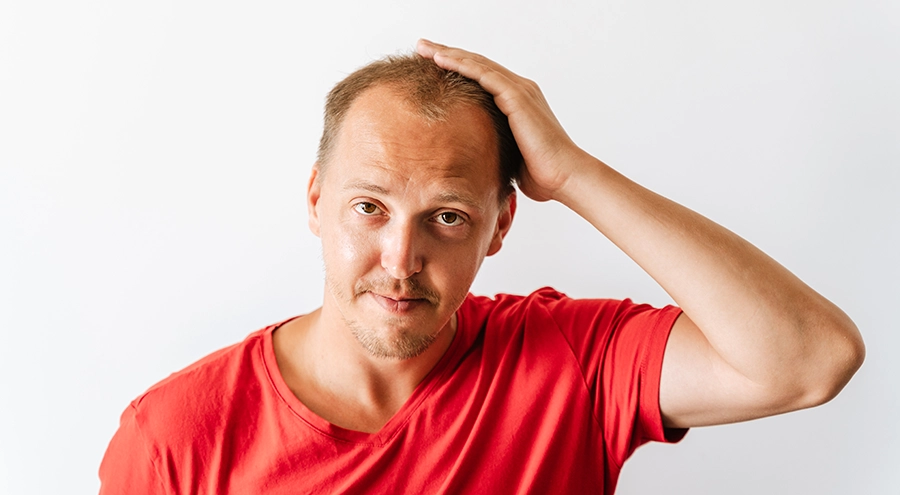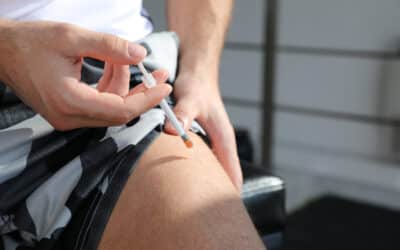Struggling with low energy, decreased libido, and a generally tired most of the time?
The problem might be low testosterone levels. Especially if you’re over the age of 40.
Getting a testosterone test is the first step. And if you do have low testosterone then you might be considering Testosterone Replacement Therapy (TRT) but wondering if it’s truly effective and safe.
There are plenty of misconceptions about TRT that can make men hesitant to seek treatment. From worries about it being like steroids to concerns about permanent side effects, misinformation often clouds what TRT is truly about. Let’s dive into some of the most common myths and clarify the facts to help you make an informed decision.
Myth #1: Is TRT like steroids?
This is one of the biggest misconceptions out there. Many people think that TRT is the same as using anabolic steroids. However, TRT is a medically supervised therapy aimed at restoring natural testosterone levels—not exceeding them. Steroids, on the other hand, are synthetic versions of testosterone used for performance enhancement, which can lead to health risks when abused.
TRT uses bio-identical testosterone, which means it’s chemically identical to the testosterone your body naturally produces. The goal is balance, not enhancement. In short, TRT is meant to correct deficiencies and improve your quality of life, not make you look like a bodybuilder from Pumping Iron.
Myth #2: Once I start TRT, do I have to continue it forever?
A lot of people believe that once you start TRT, you’re on it for life. The reality? No, you’re not locked into TRT forever. You can stop the therapy whenever you choose, and your body’s natural testosterone production will eventually return to its previous state.
That said, many men opt to stay on TRT long-term because of the benefits they experience. Increased energy, improved mood, and enhanced sexual health are just a few reasons men love how they feel on TRT. One patient in his late 40s shared that after three years on TRT, he feels like he’s in his 20s again—and has no intention of stopping. See our review for more clients who benefited from testosterone replacement therapy.
Myth #3: Will TRT cause hair loss?
This is another common concern. Hair loss is largely driven by genetics, not testosterone replacement therapy. If you’re already prone to male pattern baldness, TRT might slightly accelerate the process, but it’s not the root cause. In fact, balanced testosterone levels can actually support healthier hair growth in some men. If hair loss is a concern, it’s always best to discuss it with your doctor to assess your specific risk factors.
Myth #4: Do I have to inject myself every day?
Nope, daily injections are not a requirement! While injections are the most common form of TRT, they are usually administered weekly or bi-weekly, not daily. For men who don’t like the idea of injections, there are other options available, such as topical creams or gels, which are quick and easy to apply. Injections can be done at a clinic or at home, depending on your preference.
One patient mentioned never using injections and opting for a daily cream that takes only 20 seconds to apply. So, whether you prefer the cream or injections, there are flexible options to fit your lifestyle.
Myth #5: Will TRT cause testicle shrinkage?
Let’s address the infamous “shrinkage” myth. Yes, it is possible that TRT could lead to a reduction in testicle size, but let’s put this into perspective. When you’re supplementing testosterone, your brain signals your testicles to produce less on their own. This can result in a size reduction for some men, but typically only by about 17%, meaning it’s more like a shift from walnuts to Brazil nuts—not peanuts.
If this is something you’re worried about, there’s a simple solution. Secondary medications can be prescribed alongside TRT to maintain natural testosterone production and keep everything as it was. And rest assured, any reduction in size is purely aesthetic—there are no health consequences involved.
Myth #6: Testosterone Replacement Therapy Will Fix Erectile Dysfunction Instantly
While erectile dysfunction can be a symptom of low testosterone, it isn’t always the direct cause. Men often expect testosterone therapy to immediately resolve ED, but the reality is more complex. While TRT can help improve sexual function in men with testosterone deficiency, not all cases of ED are tied to low testosterone. Other factors, such as cardiovascular health or psychological issues, can also play a role. A thorough diagnosis is essential to determine the cause of ED before starting testosterone treatment.
Myth #7: Testosterone Therapy Causes Heart Problems
Recent research shows that Testosterone Replacement Therapy (TRT), when used appropriately and under medical supervision, does not increase the risk of major cardiovascular events such as heart attacks or strokes in men with low testosterone levels. A large study published in 2023 involving over 5,000 men with preexisting cardiovascular disease found that those who received testosterone therapy had no higher incidence of heart-related events compared to those who received a placebo (American College of Cardiology | Life Extension).
Myth #8: Only Men With Extremely Low Testosterone Levels Should Consider TRT
Many believe that only men with severely low testosterone levels are candidates for testosterone replacement therapy. However, even men with moderately low testosterone can benefit from TRT. Symptoms like fatigue, reduced libido, and difficulty maintaining muscle mass can appear at testosterone levels that aren’t extremely low. If you’re experiencing symptoms, it’s worth having your levels checked to see if testosterone treatment is right for you.
Myth #9: All Forms of Testosterone Therapy Require Injections
It’s commonly believed that all testosterone medications must be injected. While injections are one of the most popular methods, other options are available, including topical gels, patches, and testosterone supplementation in pellet form. Each method has its pros and cons, and the best choice depends on the individual’s lifestyle and treatment goals. For instance, men who prefer not to use injections may find topical options more convenient.
Myth #10: Testosterone Therapy Is the Same as Hormone Replacement Therapy for Women
While both men and women can benefit from hormone treatments, testosterone therapy for men is different from hormone replacement therapy (HRT) for women. Men undergoing TRT receive androgen therapy to replace testosterone, while women on HRT typically receive estrogen and progesterone to manage symptoms of menopause. Both therapies are designed to address hormone imbalances, but the approaches and goals differ based on gender-specific health needs.
Myth #11: Testosterone Replacement Therapy Increases the Risk of Prostate Cancer
One of the most persistent myths surrounding testosterone replacement therapy is that it increases the risk of prostate cancer. However, there is no substantial evidence to support this claim. Numerous studies have shown that TRT does not increase the incidence of prostate cancer. In fact, testosterone therapy is carefully monitored, and men undergoing TRT are regularly screened for prostate health to ensure early detection of any potential issues. While men with a history of prostate cancer should consult their doctors, TRT does not inherently lead to an increased risk of developing the condition.
Feeling More Confident About TRT?
Hopefully, these clarifications have debunked some of the myths you’ve heard about Testosterone Replacement Therapy. TRT is a safe and effective treatment when monitored by medical professionals, and it can have a significant positive impact on your energy, mood, and overall vitality.
Ready to explore TRT further? Schedule a free in-clinic testosterone test today and see if testosterone therapy is right for you.





